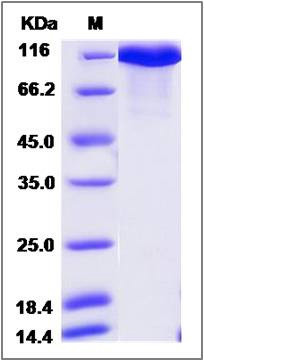Human NFASC / Neurofascin Protein (His Tag)
NF,NRCAML
- 100ug (NPP2368) Please inquiry
| Catalog Number | P15694-H08H |
|---|---|
| Organism Species | Human |
| Host | Human Cells |
| Synonyms | NF,NRCAML |
| Molecular Weight | The recombinant human NFASC comprises 926 amino acids and has a predicted molecular mass of 104.4 kDa. The apparent molecular mass of the protein is approximately 114-119 kDa in SDS-PAGE under reducing conditions. |
| predicted N | Ile 25 |
| SDS-PAGE |  |
| Purity | > 95 % as determined by SDS-PAGE |
| Protein Construction | A DNA sequence encoding the human NFASC (O94856-12) (Met1-Gln939) was expressed with a C-terminal polyhistidine tag. |
| Bio-activity | |
| Research Area | Neuroscience |Cell Type Marker in Neurodevelopment |Glial Cell Markers |Oligodendrocyte marker |
| Formulation | Lyophilized from sterile PBS, pH 7.4. 1. Normally 5 % - 8 % trehalose and mannitol are added as protectants before lyophilization. Specific concentrations are included in the hardcopy of COA. |
| Background | NFASC, also known as neurofascin, belongs to the immunoglobulin superfamily, L1/neurofascin/NgCAM family. It contains 5 fibronectin type-III domains and 6 Ig-like C2-type (immunoglobulin-like) domains. NFASC functions in neurite outgrowth, neurite fasciculation, and organization of the axon initial segment (AIS) and nodes of Ranvier on axons during early development. Both the AIS and nodes of Ranvier contain high densities of voltage-gated Na+ (Nav) channels which are clustered by interactions with cytoskeletal and scaffolding proteins including this protein, gliomedin, ankyrin 3 (ankyrin-G), and betaIV spectrin. NFASC links the AIS extracellular matrix to the intracellular cytoskeleton. |
| Reference |
